E-bikes, or electric bicycles, are rapidly gaining popularity as a sustainable and eco-friendly mode of transportation. Combining traditional pedaling with the ease of electric motors, e-bikes are changing how people commute, run errands, and explore the outdoors. But with the increasing popularity of these electric-powered two-wheelers, many are asking, Do electric bicycles need license? It’s a question that creates intrigue and discussion, as it varies based on motor power, speed, and local regulations. In this article, we will answer the licensing questions you have about e-bikes and include a nifty guide for getting through the rules and feel confident on the roads!
 Everything you need to know about electric bicycles
Everything you need to know about electric bicycles
Electric bicycles (or e-bikes as you might refer to them) are a cross between a classic bicycle and a motorbike. Basically, e-bikes are regular bicycles but with an electric motor that can assist you while you pedal. It is this motor, fed by a large battery, that reduces the difficult toil of pedaling the bike. This makes it more appealing for those who just want to ride leisurely but also daily commuters.
An electric bike typically consists of three main components:
- Electric Motor: An e-bike’s motor is the driving force that offers extra power to help the rider. Motors have different power outputs, either for moderate assistance or for tackle steep hills or high speed.
- Pedals: Just like regular bikes, e-bikes have pedals that the rider can use to manually push the bike forward. The motor operates in sync with pedaling, providing a natural experience where the user controls how much exertion is applied.
- Speed-Assist Features: Most e-bikes have adjustable settings, allowing riders to control how much assistance the motor provides. Certain models even incorporate a throttle for motor-only propulsion, making it versatile on different terrains.
E-bikes are distinct for their use of low-level motorized assistance while maintaining a traditional bike appearance and feel. E-bikes have been designed to be lightweight and put to versatile use — their speed limits tend to compare with traditional cycling, rather than with motorcycles or mopeds. This combination of work and assistance makes them suitable for a broad range of riders, from fitness seekers to those just hoping to have a greener way to get around.
The E-Bike is making its mark not only as an utilitarian choice but a remedy to the current modes of transport. They encourage cleaner air and reduced traffic jams while providing the health benefits of cycling by providing an eco-friendly alternative to cars and motorcycles.
Do Electric Bicycles Need a License? Key Factors Explained
Whether an electric bicycle requires a license depends on several important factors, including motor power, top speed, and regional regulations. Understanding these components will allow riders to identify whether or not they require a license to ride their e-bike.
1. Motor Power
The motor’s power output plays a crucial role in licensing requirements. In most regions:
- E-bikes with a motor output of up to 250 watts are generally considered bicycles and don’t require a license. In the European Union, for instance, low-power e-bikes are non-licensed.
- More powerful e-bikes (those over 750 watts in the United States) may classify as mopeds or motorcycles, necessitating a license, registration, and insurance.
2. Top Speed
Speed limits also affect whether a license is required:
- E-bikes that are capable of 20 mph (32 km/h) or less are treated as bicycles in much of the world including, for example, the United States and Australia.
- High-speed e-bikes, which can go 28 mph (45 km/h) or faster, are often regulated much more strictly. However, in some countries (such as Germany), e-bikes above 25 km/h are license and registration required.
3. Regional Laws
Local laws vary significantly, and riders must adhere to the rules of their specific location. For instance:
- In the U.S., licensing requirements vary by state. Unlike Class 1 and Class 2 e-bikes, which generally do not need to be licensed, some states, like California, may require you to have a license for Class 3 e-bikes.
- In Britain, e-bikes with a motor output greater than 250 watts or a maximum speed greater than 15.5 mph (25 km/h) are classified as mopeds and will require a driver’s license, registration, and insurance.
- Each state in Australia has its own guidelines. For the most part, e-bikes under 200 watts with a top speed of 25 km/h don’t require a license, though helmets are mandatory.
Knowing the Differences Typically, the latter is the one that gears towards compliance with the local laws while helping riders enjoy the benefits of electric bicycles. Make sure to thoroughly check regional regulations to keep yourself out of trouble will all provided guidelines and you can enjoy smooth rides.
 Electric Bicycle Licensing Regulations Worldwide
Electric Bicycle Licensing Regulations Worldwide
United States
Electric bicycle regulations in the United States vary by state. In general:
- Motor Power: E-bikes of up to 750 watts of motor power are commonly classified as bicycles.
- Speed Limits: e-bikes (Class 1 and Class 2 e-bikes maximum speed of 20 mph) do not require a license. You may get tighter requirements for Class 3 e-bikes that reach speeds up to 28 mph, including licensing in states like California and New York.
- Additional Regulations: What type of helmet riders are required to wear based on their age or where Class 3 e-bikes are allowed.
European Union
In the EU, e-bike rules are largely harmonized:
- Motor Power: E-bikes with motors under 250 watts do not need to be licensed.
- SPEED LIMITS: Assistance is restricted to speeds of 25 km/h (15.5 mph).
- Additional Regulations: If an e-bike exceeds these numbers, then it falls under the definitions of a moped or motorcycle, which means a license, registration, and insurance are required.
United Kingdom
The UK has clear regulations for e-bikes:
- Motor Power: Maximum 250 watts motor
- Speed Limits: Support features are limited to a maximum of 15.5 mph (25 km/h).
- Extra Rules: E-bikes that surpass these parameters are classified more like mopeds, requiring a driver’s license, registration and insurance.
Australia
Australia’s laws vary by state, but the guidelines are similar:
- Motor Power: Most states restrict e-bikes to 200 watts.
- Speed Limits: Support is limited to 25 km/h (15.5 mph)
- Additional Regulations: you’ll have to wear a helmet, and some states confine e-bikes to certain paths or lanes.
Familiarity with these international regulations helps riders to comply with local laws without foregoing the advantages of riding an e-bike. As always, check regional guidelines before hitting the road for a safe and legal ride.
 When Is an Electric Bicycle Considered a Motor Vehicle?
When Is an Electric Bicycle Considered a Motor Vehicle?
An electric bicycle may be considered a motor vehicle under certain conditions, typically when its specifications exceed local limits for power and speed. Understanding these scenarios can help riders stay compliant with laws and avoid fines or penalties.
1. Exceeding Motor Power Limits
If the electrical motor of an e-bike exceeds the maximum allowed wattage, it’s typically deemed a moped or motorcycle. For example:
- E-bikes with motors above 750 watts aren’t classified as bicycles in the United States and require a driver’s license, registration and insurance.
- The motor limit is 250 watts in the European Union. Bikes above this threshold count as a motor vehicle and are subject to stricter rules.
2. Surpassing Speed Restrictions
Another major point is speed. If the e-bike can carry the rider faster than thee legal limit for assisted cycling, it will be classified as a motor vehicle. Examples include:
- In the UK, e-bikes that exceed an assisted speed of 15.5 mph (25 km/h) are considered mopeds and require full licensing and registration.
- In Germany, if you want to ride an e-bike that goes faster than 25 km/h, it needs to be insured, registered and have license plates.
3. Using a Throttle for Motor-Only Operation
In some areas, e-bikes equipped with throttles that can directly drive the motor without pedaling may be classified as motor vehicles regardless of whether the motor is within wattage and speed limitations. For instance:
- Certain U.S. states require licensing for throttle-equipped e-bikes, especially if the throttle enables speeds above 20 mph.
How to Stay Compliant
To ensure your e-bike remains classified as a bicycle and avoid legal issues:
- Local Laws: Be aware of the laws in your area about motor power, speed limits, and throttle use.
- Select the Right E-Bike: Opt for an e-bike that complies with local power and speed restrictions.
- Avoid unauthorized modifications: Upgrading your e-bike’s engine or modifying its velocity settings can end in it being reclassified as a motor car.
By understanding and adhering to these guidelines, riders can enjoy the benefits of electric bicycles without facing legal complications.
 Why Understanding E-Bike Laws Is Crucial
Why Understanding E-Bike Laws Is Crucial
Knowing the e-bike law at the local level can be beneficial in many ways to the riders, helping them with safety, and the legislatures with compliance as well as positive contribution towards sustainable transportation. Here’s why you need to pay attention:
1. Promoting Safety
Knowledge of local regulations will allow riders to operate their e-bikes legally and safely within the regulatory framework. Noise pollution caused by e-bikes can be avoided by following the applicable laws and regulations covering speed limits as well as wearing helmets while riding in the appropriate zones.
2. Avoiding Legal Issues
Understanding the e-bike laws and obeying them can protect riders from costly fines, penalty points, or their bikes getting impounded. Licensing, registration, and motor power laws differ considerably between regions, and staying on top of them will save you lots of money in court handling penalties.
3. Supporting Sustainable Transportation
Supporting sustainable transportation when riders follow local e-bike laws Maintaining compliance cultivates public confidence in e-bikes as a viable, low-impact transportation solution, persuading more of the population to transition to this mode of transport and lessen the carbon emissions of everyone.
4. Enhancing the Riding Experience
Understanding the rules means riders will be able to enjoy their surroundings, confident they are doing so legally. It is peace of mind that enables a more relaxed and worry-free ride.
Knowing the rules governing e-bikes is a duty that helps individual riders as well as society as a whole. Informed riders are essential in forming the future of eco-friendly transportation by promoting safety, legality, and sustainability.
Conclusion
Do you need a license for electric bicycles? This will vary based on a number of factors, such as how many watts the motor specs, top speed, and local regulations. Most e-bikes with motors under 750 watts and speeds under 20–28 mph fall under a bicycle category, thus requiring no license. But if you exceed these thresholds or use features such as throttles, an e-bike may be classified as a motor vehicle, requiring licensing, registration, and insurance.
Local laws ensure safety and compliance, and riders can still have the convenience and accessibility of much e-bikes. Whether you’re using it to ride to work, out in nature, or just for the excitement of it, being well-informed not only saves you from potential legal hassles, but paves the way for greater acceptance of sustainable transportation.
Check your regional e-bike laws today and ride responsibly to make the most out of this eco-friendly and efficient mode of transportation.
Read Next…
Best regards,
~Team BikeBicycler
